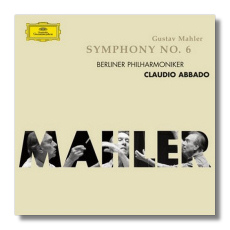
The Internet's Premier Classical Music Source
Related Links
- Mahler Reviews
- Latest Reviews
- More Reviews
-
By Composer
-
Collections
DVD & Blu-ray
Books
Concert Reviews
Articles/Interviews
Software
Audio
Search Amazon
Recommended Links
Site News
 CD Review
CD Review
Gustav Mahler

Symphony #6
Berlin Philharmonic Orchestra/Claudio Abbado
Deutsche Grammophon 477557-3 DDD 79:37
Also released on Hybrid SACD 477568-4
Amazon
- UK
- Germany
- Canada
- France
- Japan
- ArkivMusic
- CD Universe
In 2000, Claudio Abbado underwent surgery for stomach cancer. Not much was heard from him until 2002, when returned to give his final concerts as Music Director of the Berlin Philharmonic. That was not to be the end of his relationship with Berlin, however. In June 2004, for example, he performed Mahler's Sixth in the Philharmonie, and this new recording comes from that concert – or, as is more likely, the best portions of two or more concerts.
Abbado's relationship with Mahler's symphonies has been slow and steady, at least on CD. It's been about ten years since his excellent Fifth was released (437789-2), and now there also are recordings of the Seventh (471623-2) and Ninth Symphonies (471624-2) – all with the Berlin Philharmonic. (Also, there are earlier recordings of several other Mahler symphonies, with the Chicago Symphony Orchestra and Vienna Philharmonic.)
This new Sixth was worth the wait. Abbado's Mahler is objective but not cold. It rests neatly between Boulez's clinical interpretation and the twisted hysteria of Bernstein. There are so many great interpretations of this work, and so many contrasts, that it is hard to come up with a short list. In addition to Boulez and Bernstein II (and now Abbado), one also must mention Zander, Barbirolli, Karajan, Horenstein, and Szell as having valuable statements to make about this music.
Abbado builds the symphony's edifice masterfully. The tension ratchets upwards a notch in each successive movement. (In this performance, the Andante moderato comes second and the Scherzo comes third.) So, even though the first movement initially seems a little underpowered, this potential fault becomes a virtue when one realizes that Abbado is holding back just to be more gripping later on. Architecture within movements is handled finely too. Abbado does not bludgeon the listener with one shattering climax after another, but rather leads the listener to each movement's unique crisis. Another glory of this recording is the playing of the Berlin Philharmonic, and the clarity that Abbado achieves within and between its sections. This is gorgeous playing, and exquisitely balanced. At the same time, this is not sound for sound's sake (as one sometimes finds in Karajan), but a successful attempt to realize everything that Mahler imagined an orchestra could do. At the symphony's end, there are a few moments of silence, and then comes the applause – and soon after, cheers. One can appreciate both the audience's initial stillness – in Abbado's hands especially, the end of this symphony is shattering – and their subsequent enthusiasm. DG's engineering team has captured the music and the space that it lives in remarkably.
Copyright © 2005, Raymond Tuttle




















